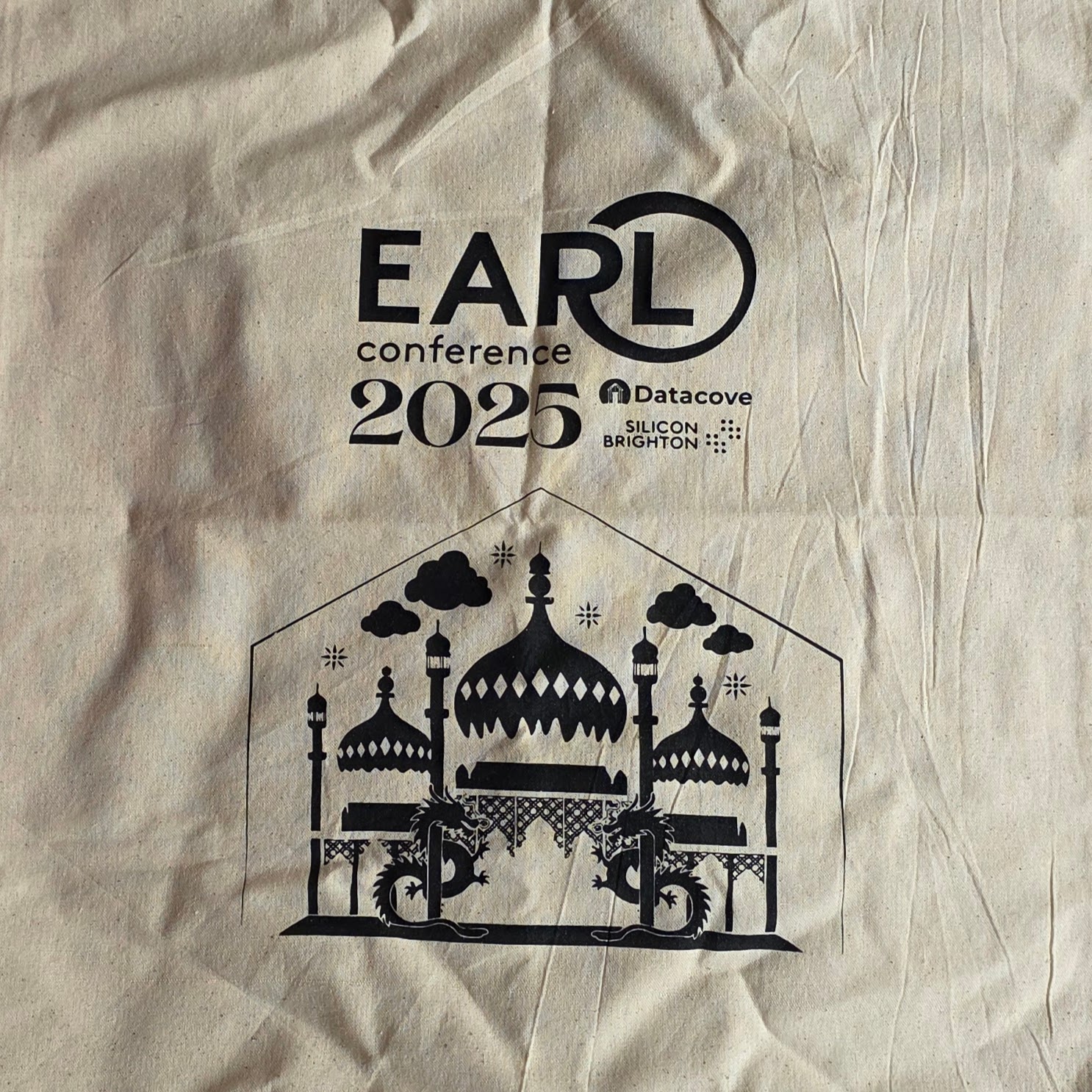Huge thanks to Datacove and all the organizers and sponsors of EARL 2025. Fantastic to meet, connect, and hear from so many practitioners of enterprise applications of data and data science.
🚆 It started with a cancelled train and a long wait in the (presumably) dying British institution of Costa Coffee. It quickly got better.

🎨 First day of main event started strong with an insightful talk by Eric Drass. His art is maybe not for my walls, but he has thought long and hard about AI and society and is well worth a listen. (And he is an old perl hacker, so he’s OK by me…)
✨ Great line-up of speakers all of the day, finishing strong with Craig West talking about AI agents before a lovely evening event at the Royal Pavilion. More on that another day.
Themes that emerged for me included:
The Convergence of R and Python: A Polyglot Future
A feature of the conference is the seamless integration of R and Python, not as competing languages, but as complementary tools in the data scientist’s arsenal. Many presentations explicitly mention the use of both languages to solve complex problems, reflecting a growing trend towards a ‘polyglot’ approach in data science teams.
This pragmatic, tool-agnostic approach suggests that the era of language tribalism is waning, replaced by a focus on using the best tool for the specific task at hand.
The Pragmatic Application of Generative AI: From Hype to Utility
While the excitement around generative AI and Large Language Models (LLMs) is palpable, the conference agenda demonstrates a clear shift from theoretical discussions to practical, real-world applications. The focus is on how these technologies can be harnessed to deliver tangible business value and enhance existing workflows.
The emphasis here is on the ‘how’ rather than the ‘what’ of generative AI, signalling a maturation of this technology within the enterprise.
Data Science for Social and Public Good: A Focus on Impact
A significant number of presentations are from organisations in the public and non-profit sectors, highlighting a strong undercurrent of using data science for social good. These talks demonstrate the power of data to address some of society’s most pressing challenges.
This theme provides a vital counterpoint to the purely commercial applications of data science and underscores the profession’s potential to make a positive societal impact.
The ‘Last Mile’ of Data Science: Production, Validation, and Adoption
The conference places a strong emphasis on the often-overlooked ‘last mile’ of data science: the challenges of deploying, validating, and ensuring the adoption of data products. This reflects a growing recognition that a model is only as good as its implementation and its impact on decision-making.
This focus on the operational aspects of data science signals a maturing of the profession, moving beyond a sole focus on model building to a more holistic view of the data science lifecycle.
Bridging the Gap: From Data to Decision
A final, overarching theme is the relentless focus on ensuring that data science leads to better decisions and commercial outcomes. This is the thread that connects all the other themes and is at the heart of my own professional focus.
A final, overarching theme is the relentless focus on ensuring that data science leads to better decisions and commercial outcomes. This is the thread that connects all the other themes and is at the heart my own professional focus.
The conference as a whole, with its mix of technical deep dives, case studies, and strategic discussions, is designed to equip practitioners with the skills and knowledge they need to bridge the gap between data and decisions, and to unlock new value through data-driven innovation.

While some talks touch on responsible AI, there was no dedicated track on the ethical implications of data science, such as bias, fairness, and transparency.
I am happy with the approach to safe and responsible AI we have adopted at Barnett Waddingham but it requires constant vigilance as tools develop. Conferences like this are invaluable.
🤔 How are you staying on top of developments in your area? As a leader, how do you connect with practitioners? 🔗
About me: I help organizations turn complex data into clear decisions and commercial outcomes. My focus is on enabling better decision-making and unlocking new value through data-driven innovation — especially where the stakes are high and the problems are difficult and poorly defined.
Follow me here and on LinkedIn for more insights.